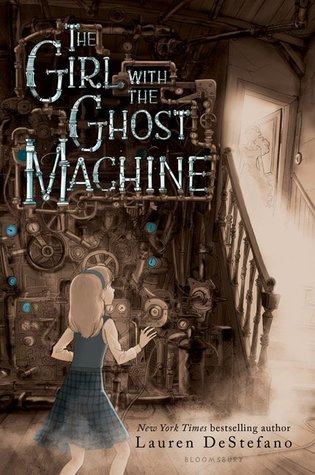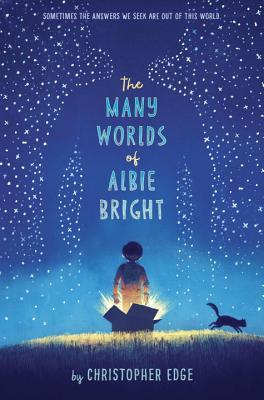 DeStefano, Lauren. The Girl with the Ghost Machine
DeStefano, Lauren. The Girl with the Ghost MachineJune 6th 2017 by Bloomsbury USA
E ARC from Netgalley
After Emmaline's mother dies, her father locks himself away in the basement, trying to create a machine that will draw her spirit back to the house so that they can visit. He doesn't work, he doesn't take care of Emmaline, and it's as if she has lost her father as well. In anger, she throws a cup of tea into the machine hoping to break it, and her mother appears and has a cup of tea with her. Talking about this later with her friends, next door neighbors and twins Gully and Oliver, the three decide that in order for the machine to work, an object related to a memory has to be thrown in, the ghost appears, but then goes away and the memory is lost. The twins ask to see their dog Tidbit, and three neighbor ladies ask to see their long gone brother, but the only one who uses the machine a lot is Emmaline's father. He seems a little happier, and goes back to work, but Emmaline still doesn't feel that he has returned to her. After a tragedy, her father sees the error of his ways. Emmaline grows old with the machine in the basement, but manages not to use it, with one notable exception.
Strengths: I like the name Emmaline, and the blue and brown on the cover are attractive.
Weaknesses: The entire book is about sadness and loss in a very sad, soggy way. While Emmaline is to be applauded for not wanting to use the machine, I can't think of any of my students who ask for "poignant" books that are this slow and sad.
What I really think: If a ghost machine really existed, I would throw in every memory I had of people who were gone. Then I wouldn't remember them at all, and I wouldn't be sad about them anymore. Is this the lesson the book wants to teach us? Because that's what I got out of it.
 Edge, Christopher. The Many Worlds of Albie Bright
Edge, Christopher. The Many Worlds of Albie BrightMay 30th 2017 by Delacorte Press
E ARC from Netgalley
Albie's mother and father are both scientists who deal with Quantum physics. His father is a television personality who also writes books explaining physics to lay people, and his mother has worked with the Hadron Collider. When his mother is diagnosed with cancer, the family moves back to England to be near the mother's father. After her death, Albie's father sends him back to school and immerses himself in his work, but has planted the thought that perhaps in a parallel universe, Albie's mother is alive. Albie thinks this is worth investigating, so he makes a Schrodinger's Cat type box with his mother's quantum computer, a Geiger counter, and a banana, and manages to travel to several different alternate universes. In one, he meets himself, but he is evil and his mother passed away when he was a baby. In another, he is a girl named Alba, and his mother died in a car accident. When he finally meets his mother, there are other complications, and Albie finally realizes that even if he met his mother in another universe, his father really needs him at home.
Strengths: This actually was fairly upbeat, except for the father neglecting the son. (That's what all grieving parents do, right?) Albie is able to make peace with his reality. It moved quickly and was actually fairly engaging. Appreciated that the mother was a high powered scientist, and lots of science was involved. Bonus points for making his device; sort of like the bathtub with the computer in Welford's Time Traveling with a Hamster.
Weaknesses: This is a very British book. I think it will appeal more to elementary readers. Middle school students are less involved with their parents.
What I really think: Will probably pass on purchasing unless I have a lot of students ask for books about grieving or alternate universes.

No comments:
Post a Comment